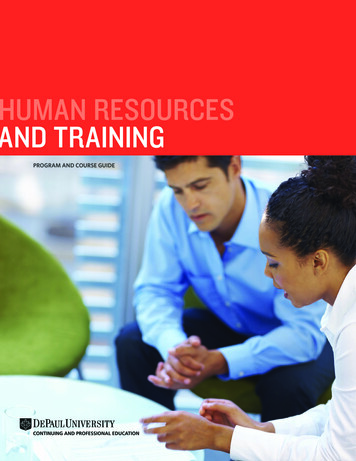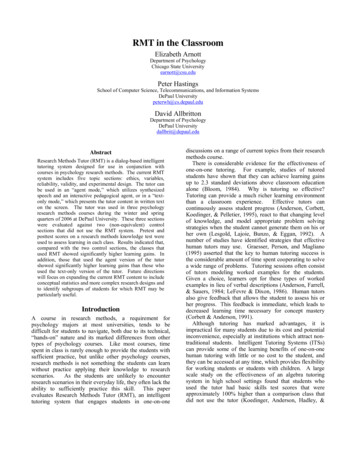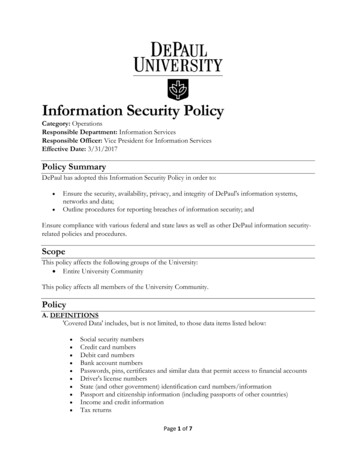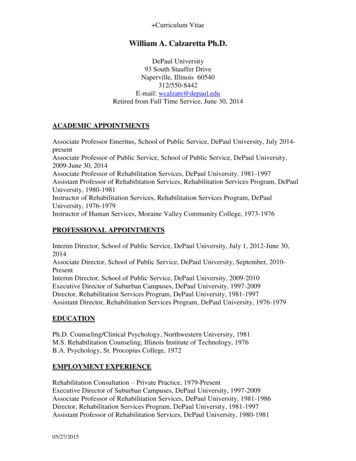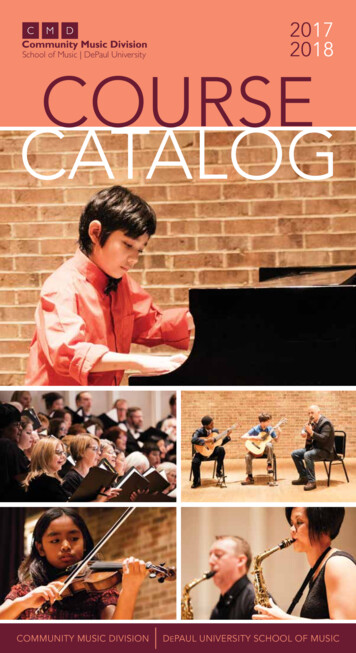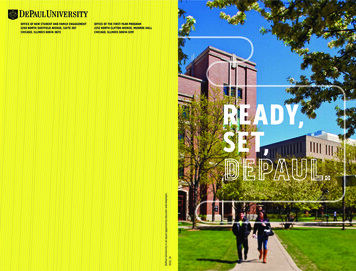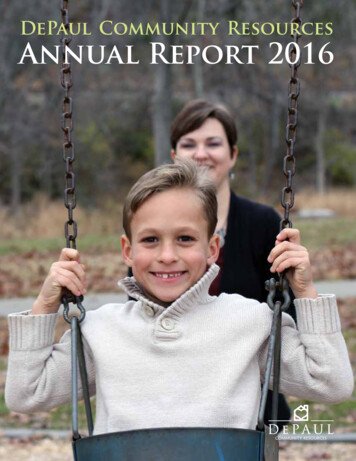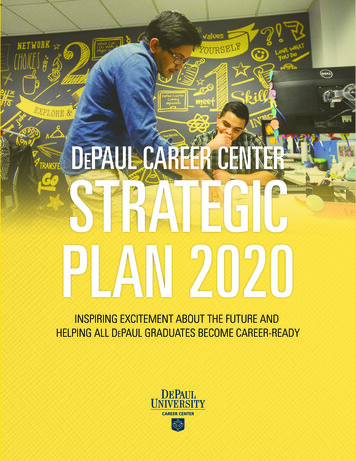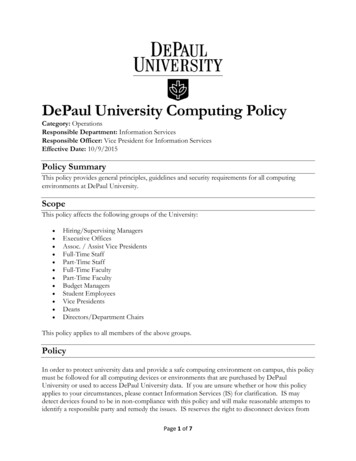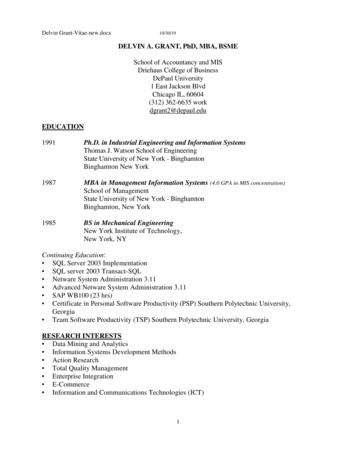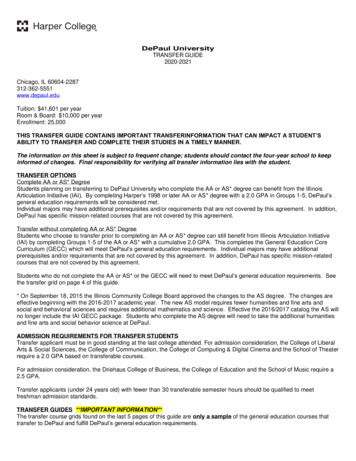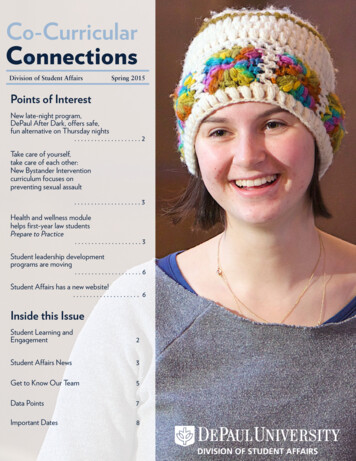
Transcription
Co-CurricularConnectionsDivision of Student AffairsSpring 2015Points of InterestNew late-night program,DePaul After Dark, offers safe,fun alternative on Thursday nights.2Take care of yourself,take care of each other:New Bystander Interventioncurriculum focuses onpreventing sexual assault.3Health and wellness modulehelps first-year law studentsPrepare to Practice.3Student leadership developmentprograms are moving.6Student Affairs has a new website!. 6Inside this IssueStudent Learning andEngagement 2Student Affairs News 3Get to Know Our Team5Data Points 7Important Dates 8
New late-night program,DePaul After Dark, offerssafe, fun alternative onThursday nightsBy: Rocio Ortega“Bingo!” shouts a DePaul student sitting in a packedroom; not a single empty seat is to be seen among the100 or so other students vying for the prize. Uponwinning bingo, the student heads to the front of theroom to ‘grocery shop’ and pick six items among agranola bar section, a fresh produce section and otherproducts purchased from Whole Foods by the DePaulAfter Dark team.This is pretty much how every grocery bingo game hasplayed out during DePaul After Dark, a new late-nightprogram for students that features free food, giveawaysand a variety of fun and free activities. The Office ofStudent Involvement and the DePaul Activities Board,a mentored student organization, have partnered withthe Ray and Student Centers to launch the programwith the intent to provide students with an alternativeto the typical Thursday night plans of college students.“It is something to do that is actually more fun thangoing out and partying,” said one DePaul student.The first two DePaul After Dark programs drew closeto 600 attendees, making the program a resoundingsuccess.Amy Mynaugh, director of Student Involvement,explained that DePaul may be a mostly commutercampus in the middle of a city packed with thingsto do, but that should not keep the university fromproviding options on campus. “We need to buildcommunity and offer students the opportunity toconnect with one another on campus. When you feellike you genuinely belong to a community, you want tostay there,” says Mynaugh.DePaul After Dark is a built-in study break, too, saysMynaugh. “To be successful, you cannot just hit thebooks 24/7. Students need to give themselves the2 Co-Curricular Connectionsopportunity to recharge and consider their healthand wellness. They need to be engaged beyond theclassroom setting.”The DePaul Activities Board, along with TanyaVandermoon, program coordinator for campusactivities, has taken the lead in planning theseprograms. It has all been created by students,and the activities are bounded only by the limitsof their imaginations. Each program is given adifferent theme, and a variety of activities are staggeredthroughout the night to attract all kinds of students.Rachael Driussi, president of the DePaul ActivitiesBoard, provides support for the volunteers during theseevents. “We dove right in and came up with ways tomotivate students to attend and then get them to stayand enjoy multiple activities once they got there,” saidDriussi. Shannon Daly, vice president of the DePaulActivities Board, said that DePaul After Dark is auniversity tradition in the making. “It has been excitingto watch the program grow over the quarter. For thefirst event, we had no idea that it would draw thecrowd that it did,” said Daly.Data show that the program is reaching a wideaudience that includes commuter students coming fromlocations all across the city. As the pilot continues, theteam will continue to gather information about theaudience, including year of study, discipline and initialimpressions of the event. This summer, they will reviewdata and use it to improve DePaul After Dark, as wellas identify university partners for the program.If you are interested in co-hosting or volunteeringfor an event, or just want more information aboutDePaul After Dark, contact Tanya Vandermoon at773.325.2468.Image courtesy of Jamie Moncrief, DePaul University
Take care of yourself, take care of each other: NewBystander Intervention curriculum focuses on preventingsexual assaultBy: Rocio OrtegaYou are walking down a sidewalk on a sunny eveningand notice a woman fall down while riding her bike.You think, for a second, that you should go andmake sure she is okay, but you are already late for anappointment and, besides, someone else will surely seeher and come to her aid. You let that thought comfortyou, and go about your day.This is the bystander effect, explained ShannonSuffoletto, director of the Office of Health Promotion& Wellness. “Essentially, the idea is that no one doesanything to help because they believe someone elsewill rise to the occasion. That is a societal fact and itis one we want to change at DePaul. We want it to bethe norm that we all feel a responsibility upon enteringthis community to take care of ourselves and others.”With this in mind, the Office of Health Promotionand Wellness launched a new bystander interventiontraining curriculum last fall. The program trainsbystanders to intervene in a problematic situationand is a comprehensive, three-hour curriculum onsexual and relationship violence. Nationally, researchhas shown that bystander intervention is one of themost effective ways to prevent sexual and relationshipviolence on campus, explained Sexual Health andViolence Prevention Specialist, Rima Shah.The training has already been offered to the Officeof Multicultural Student Success STARS mentors.Orientation leaders, transfer student leaders andChicago quarter mentors will complete the training inMay.continued on page 4Health and wellnessmodule helps first-yearlaw students Prepare toPracticeBy: Rocio Ortega‘If necessary, an oxygen mask will drop from above yourseat make sure your mask is secure before helpingothers.’ Upon boarding a plane, all passengers will hearsome variation of these instructions during the preflight safety demonstration. Interestingly enough, theseguidelines are also applicable to many other areas of dayto-day living, explains Brooke Halpern from UniversityCounseling Services and Tom Judge, from the Office ofReligious Diversity in the Loop.Judge partnered with Halpern, an extern with UniversityCounseling Services, along with the Office of HealthPromotion and Wellness and the Lawyers AssistanceProgram to create a 75-minute module on health,wellness and balance as part of a new program calledPreparing to Practice, or P2P. This is the first year of LawCareer Service’s year-long mandatory P2P course forfirst-year law students. The skill-building series introducesstudents to the legal profession and provides an overviewof the strategic and personal skills critical for success inthe professional world.“If we want to help people as lawyers, or just everyday human beings, we have to make sure we take careof ourselves, first,” said Judge. “Legal education ischallenging because there are surprising expectationsset for these students. Once practicing law, their livescontinue to be challenging. They have demanding clientsand demanding employers. All of that pressure and stresscontinued on page 4Co-Curricular Connections3
Bystander Intervention training(continued from page 3)The training is open to the entire DePaul community andis available for classes or student groups upon request.The module gives participants the opportunity topractice intervention techniques and skills and to learnto identify a potentially problematic situation. “We cangive students, faculty and staff basic information, butwhat they really need is a place where they can safelypractice intervening, and break down the cultural andpsychological barriers of intervention,” stated Suffoletto.Cristina Vera, a student at DePaul and the vice presidentof the Student Government Association echoedSuffoletto’s thought. “The most rewarding experience wasputting into action what we had learned. We broke upinto groups and had to critically think about appropriateactions to take in the scenarios we were given,” said Vera.“Now that I have been trained I feel more comfortableand prepared to intervene in ways that will not put me orothers at risk.”The new curriculum is currently being evaluated byfaculty in the Psychology department. “One of the uniquefeatures of bystander intervention programs is that theyencourage an entire campus community to change theculture and norms surrounding sexual and relationshipviolence. Hopefully this can lead to long term decreases inthe prevalence of these forms of violence,” said assistantMichelle Johnson of Health Promotion and Wellness with a studentduring a winter eventprofessor of psychology, Megan Greeson.“Our evaluation team is working with the Office ofHealth Promotion and Wellness to collect data tounderstand students’ reactions to the workshops and theirsuggestions for making it more relevant and relatable totheir lives,” Greeson continued.In addition to the training, all incoming first year andtransfer students entering DePaul next fall will participatein an online sexual assault prevention training module.This educational module, powered by Everfi, includestraining related to sexual violence and relationships,as well as resources available at DePaul. For moreinformation about the Bystander Intervention training,or to schedule a training for your class or department,contact Shannon Suffoletto at 773.325.5653.Health and wellness module helps first-year law students(continued from page 3)can push people to neglect their health and wellness.As a consequence, it’s important for people to have thespiritual and emotional resources needed to flourish intheir lives and in their professions.”Judge and Halpern have presented their module to foursections, each composed of around 60 students, whohave engaged in conversation about their law schoolexperiences. The presentation encourages studentsto think holistically about their mental, physical andspiritual health, and shows them ways to sustain ameaningful career, and a satisfying life for themselves andthose who depend on them. Resources shared includedhandouts outlining 100 ways to reduce stress, the sixareas of wellness and a self-care inventory.Amanda Alasauskas, a student from the College of Lawsaid, “It was eye opening to see all of the ways that weare able to take time for ourselves throughout the day tomanage stress; whether it’s taking a nap, walking a dogor cooking a meal.”4 Co-Curricular ConnectionsBonnie Tunick, assistant director of Law Career Services,believes that Judge and Halpern’s module is one of themost successful P2P sessions yet. “Going through lawschool, or any educational experience, is like a threelegged stool,” said Tunick in an interview. “You haveyour academics, your career development and then thethird leg, which is all about you: get enough sleep, eatright, exercise and balance your work with time forfriends and family. That third leg also needs to be strongor else your stool will fall over. This wellness part of P2Phelped us make that leg of the stool stronger.”Tunick hopes that these types of programs will helpstudents take a more holistic approach to law. “Ifstudents are not happy or whole in their lives, they aregoing to take that pressure wherever they go,” she stated.For more information about the P2P program, contactTom Judge at 312.362.6699.
Please help us welcome new staff members who joined us during the winter and spring quarters.Kate Lower is a licensed clinicalprofessional counselor and boardcertified dance/movement therapist,who provides support to studentsand faculty dealing with substanceabuse and addiction.With more than 8 years’ experiencein health and wellness, Kate bringsa holistic, mind-body approachto defining and strengtheningKate Loweremotional and physical well-being.Alcohol and SubstanceAbuse Prevention SpecialistShe leads campus-wide engagementHealth Promotion andand prevention programs to deepenWellnessawareness about the effects ofsubstance abuse and to promotehealthier, happier decision-making.Kate joined DePaul in January 2015 and is excitedto engage with students, staff and the entire campuscommunity to nurture a more dynamic, vibrant, healthyDePaul.Jennifer HarrisConsulting PsychiatristUniversity CounselingServicesJennifer Harris joined UniversityCounseling Services (UCS) asconsulting psychiatrist in March2015. In this role she collaborateswith Counseling Services staff to carefor students who seek help with awide range of difficulties or concerns.Sometimes, this involves prescribingand monitoring medication ortreatment. Students are seen forpsychiatric evaluation when referredby UCS psychologists, and thenmay continue their care at UCSor be referred to clinicians in thecommunity.Prior to joining the UCS staff, Jennifer was staff psychiatristat The University of Chicago’s Student Counseling Servicefor five years.Jennifer has a bachelor’s degree in English and Americanliterature from Bowdoin College. She completed her MDdegree at the University of Pittsburgh School of Medicine,and then trained as a resident and served as chief resident ingeneral adult psychiatry at Brown University Alpert Schoolof Medicine. She completed her training with a one-yearfellowship in University Student Mental Health at TheUniversity of Chicago.Kimberly EverettDirectorOffice of MulticulturalStudent SuccessKimberly Everett began serving as theDirector of the Office of MulticulturalStudent Success on April 6, 2015.In this role, she is responsible fordeveloping, implementing andassessing strategies that contributeto the persistence and graduationof low-income college students, firstgeneration college students, andstudents of color.Prior to her role as director of the Officeof Multicultural Student Success, shefounded the African American ResourceCenter at Northeastern University. Additionally, Kimberlyhas past experience as an academic advisor within theTRiO program at Iowa State University.She earned her BS in elementary education and will earnher PhD in educational leadership and policy studies fromIowa State University.Aaron WhiteTechnology ProjectCoordinatorStudent AffairsAaron White has served as theinformation technology projectcoordinator in Student Affairssince February 2015. In his role,he assists the division of StudentAffairs with projects related totechnology, data and informationmanagement, and web developmentand maintenance. He also providestraining to staff regarding the use ofinformation systems and software,and supports divisional assessment,communication and research initiativesby creating online forms, surveys andcommunications.Prior to his role as project coordinator, Aaron workedas a technology graduate assistant for DePaul’s divisionof Students Affairs. He has also worked at AAR Corpas a web developer from 2010 to 2012, and held severalstudent positions at DePaul during his undergraduateexperience as far back as 2007.Aaron completed an MS in e-commerce technology and aBS in information systems at DePaul University. He alsoholds a BS in international business administration fromLinköping University in Sweden.Co-Curricular Connections5
Student leadership development programsare movingAs of July 1, 2015, the Student Leadership Institute willno longer be a stand-alone department and leadershipprograms will be integrated into the Office of StudentInvolvement on the 2nd floor of the Lincoln Park StudentCenter. Housing student leadership programs in StudentInvolvement is another step that Student Affairs is takingto more strategically and efficiently provide co-curricularprograms and services for students.Student leadership development programs and servicesare key to many students’ experiences at DePaul, so all ofthe scholarships and many of the programs and servicesthat the Student Leadership Institute currently offers willcontinue to exist, and students will be served by the Officeof Student Involvement. The exact offerings are still to bedetermined, and a communication will go out to studentsand key partners in June with the final details.Student Affairs has a newwebsite!Student Affairs is happy to announce that ourwebpage has a new look, and is easier than ever tonavigate. Visit it now!Information about the programs and services we offer to encourage student progress and success is nowavailable in one place, rather than spread out across25 department-related websites. And, students cannow find support based on the question they have orthe issue they are facing, rather than by department.Information about the following is included on thesite: Student Life, including student organizationsSupport services, such as counseling andhealth servicesSupport for specific populations, such asadults, commuters, students with disabilities, and LGBTQ students, among othersDiversity and culture programsSpirituality programsOn-campus eventsParent and family programsVisit today, and explore how the division of StudentAffairs contributes to the DePaul student experienceand student success!Photo courtesy of Maria Toscano, DePaul University6 Co-Curricular Connections
Data PointsDePaul After DarkA program that offers a safe and healthy alternativeto more destructive behaviors and habits that studentstend to engage in on Thursday nights. 833 participants engaged in DePaul After Dark inJanuary and February. 668 of those students wereunique participants. 357 students attended the first DePaul AfterDark, which was held in January and had a TreatYourself theme. 234 students attended the second DePaul AfterDark in February, which had a Rock Stars theme. 242 students attended the DePaul After Darkevent held during Blue Demon Week. It was inthe Ray Meyer Fitness and Recreation Center, andhad a retro sports theme. 2 events are scheduled for April: the April 9 eventhad a TV theme, and the April 16 event has acarnival theme.Blue Demon Week 400 scholarship donations were made during theBlue Demon Giving Challenge.647 students attended the Blue Demon Dance15 affinity-building events were held during theweek.1,750 computer screens had the Blue DemonWeek is Here! image, which is about 85%of computers on campus.40 chalked images were applied to the sidewalksaround the Lincoln Park Campus.10 large scale banners were hung across LincolnPark and the Loop.Photos courtesy of Jeff Carrion and Jamie Moncrief, DePaul University7 Co-Curricular Connections
Sexual Assault Awareness Month, AprilThe Sexual Health and Violence Prevention specialistin the Office of Health Promotion and Wellnesshas coordinated a number of programs and eventsthroughout the month of April for Sexual AssaultAwareness Month.DemonTHONFriday, April 24 to Saturday, April 25, 20155:00 p.m. to 5:00 p.m.Lincoln Park, McGrath-Phillips ArenaDemonTHON is a year-long fundraising organizationbenefiting Ann & Robert H. Lurie Children’s Hospitalof Chicago. The 24-hour dance marathon on April24-25 is the celebration of the year-long fund raisingefforts done by students at DePaul. Donate online, orgo here to volunteer.LGBTQA Awareness Month, MayOpening breakfastFriday, May 19:00 to 11:00 a.m.LGBTQA Student Services has coordinated a numberof programs and events throughout the month of Mayfor LGBTQA Awareness month. RSVP for the openingbreakfast featuring Julia Serano, who will discussher book, Excluded: Making Feminist and QueerMovements More Inclusive.Vincentian Service DaySaturday, May 28:00 a.m. to 3:30 p.m.Join the Vincentian Community Service Office andover 1,400 students for a day of service in and aroundChicago. Culminates with the Vincent Festival from1:30 to 3:30 on the Lincoln Park Campus Quad.Co-Curricular Connections is a publication of theDivision of Student Affairs at DePaul University. Inquiriesand comments are welcome. Please contact us at 25E. Jackson Blvd, Suite 1400, Chicago, IL 60604 or viae-mail at depaulsanews@depaul.edu.Please take a moment to tell us how we are doing.Editor: Jessica Peterson, Marketing Communications Specialist, Student Affairs
data and use it to improve DePaul After Dark, as well as identify university partners for the program. If you are interested in co-hosting or volunteering for an event, or just want more information about DePaul After Dark, contact Tanya Vandermoon at 773.325.2468. 2 Co-Curricular Connections New late-night program, DePaul After Dark, offers
